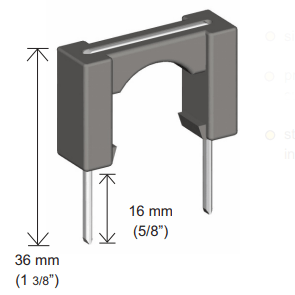Take advantage of our expertise





ECOSOLARIS PEX stapler
- This easy-loading and portable manual stapler includes a magazine feed and operates from a standing position to quickly secure a layout of PEX pipe to a wooden sub-floor like plywood
- Smooth non-jamming action
- Ergonomic vertical action
- Compatible with 3/8″, 1/2″ and 5/8″ PEX tubing
TECHNICAL SPECIFICATIONS
- Length: 39 1/4″ – 1 m
- Weight: 5.5 Lbs – 2.5 Kg
- Can contains up to 80 staples
PEX STAPLES TECHNICAL SPECIFICATIONS
- Simple and reliable
- Protection of the pipe by complete plastic surrounding
- Staples resist foot traffic when installed
Note: In order to avoid failure caused by small traces of glue the adhesive tape has to be removed during you refill the magazine
The recommended distance between the pipes is 9 inches or 12 inches. At Ecosolaris, we recommend installing them at 9 inches so that the temperature of the slab is more uniform.
However, two separate rows of 6 inches along the exterior walls and 5 separate rows of 6 inches along the walls with garage doors or curtain walls are required.
If the pipes are installed at a distance of 12 inches we calculate the total area multiplied by 1.2
exemple: 500 ft2 x 1.2 = 600 feet of pipes
If the pipes are installed at a distance of 9 inches, we calculate the total area multiplied by 1.5
If the pipes are installed between the joists we calculate the total area multiplied by 2
The minimum concrete thickness required is 1-1 / 2 “. This thickness of concrete is found when the pipes are installed upstairs or during renovation where the pipes are placed on an existing slab.
Otherwise, in general, the minimum concrete thickness required is 4 “for a basement or garage.
Ideally Pex pipes should not be installed deeper than 4 ” into a concrete slab.
For slabs that require insulation, there are two different methods of attaching PEX tubing. The first method is to place a wire mesh over Styrofoam or sprayed polyurethane insulation (minimum R10 insulation factor) and secure the pipe over it with tie-wrap. The second option is to use Isorad or Hydropex style insulation and insert the pipes between the grooves. We still recommend the use of U-Clips to secure the pipes in the curves. For uninsulated slabs, when the pipes are laid on q plywood, the use of J-Clips is the easiest way to hold the pipes in place.
The maximum length of a loop (round trip) is 300 feet. Exceeding this length, the temperature difference between the out and the return may be too great, making some parts of the floor cooler and therefore less comfortable.
IMPORTANT NOTE: No joints should be used in the piping that will end up in the concrete.
You can use only water in your radiant floor system, but propylene glycol will allow you to avoid worrying about the pipes freezing in the event of a prolonged power outage (e.g. an ice storm). When mixed in a proportion of 70% water/30% glycol, your system will be protected from freezing until the liquid in your floor reaches -12 degrees Celsius. When mixed in a 50%/50% ratio, it will be protected until -34 degrees Celsius. Finally, if you choose propylene glycol with a corrosion inhibitor like the one from Ecosolaris, the components of your system will benefit from additional protection against rust.
TOP QUALITY COMPONENTS
We pride ourselves on offering quality products that meet the highest standards in the industry.
SUPERIOR WARRANTIES
The guarantees offered on our products speak for themselves.
DEDICATED AFTER-SALES SERVICE
Our team of experts will help you successfully, whatever the nature of your request.!













